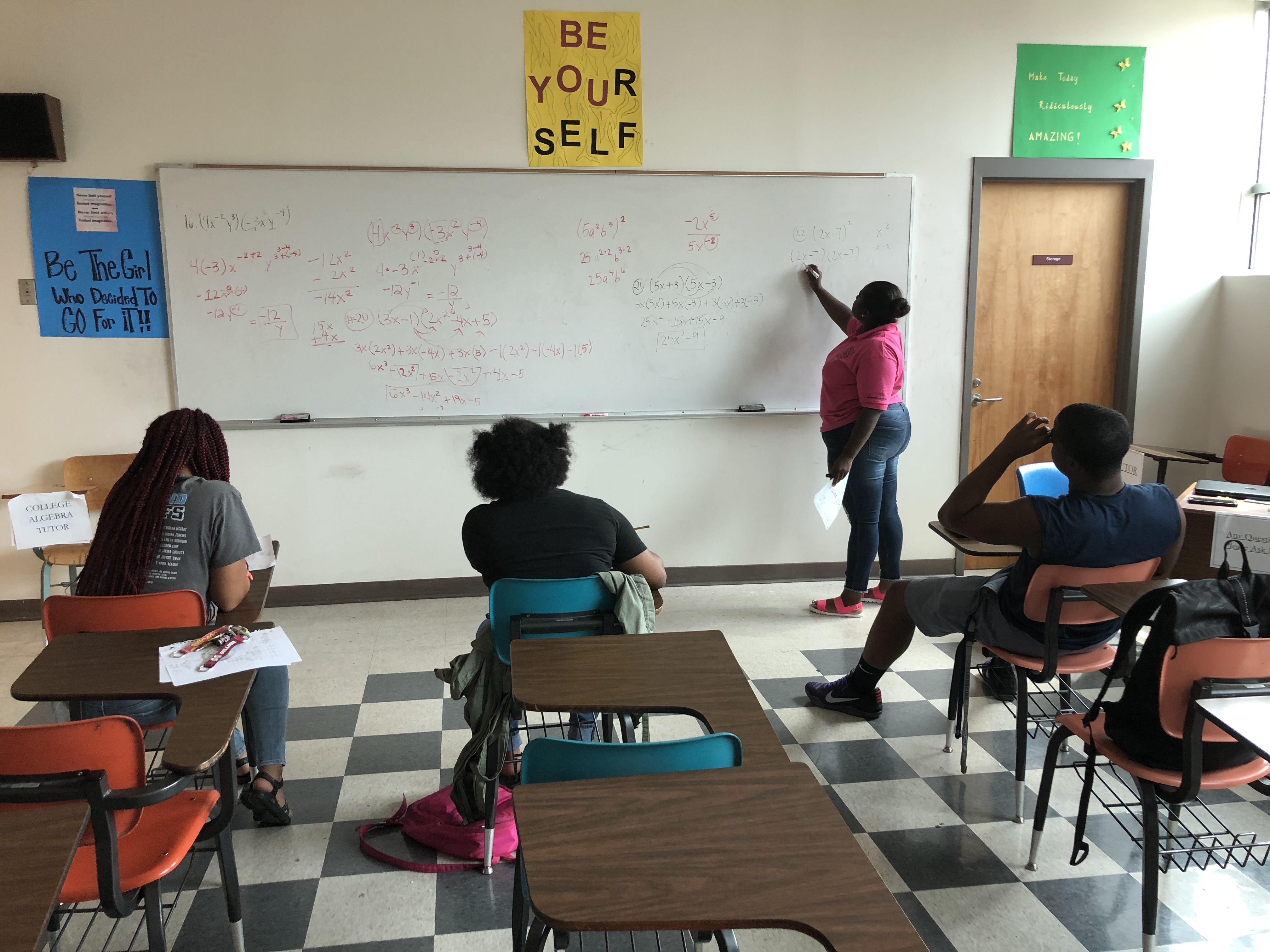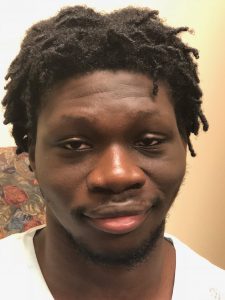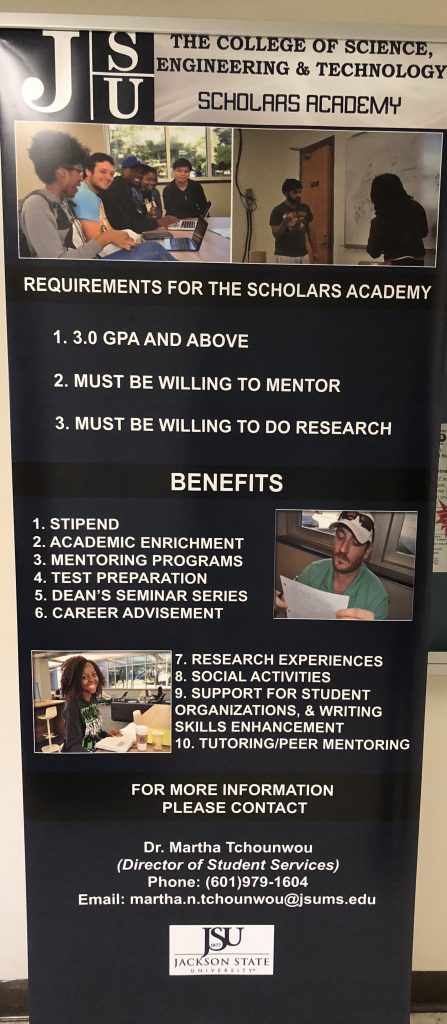
![]()
[hr]CSET Scholars Academy may seem like JSU’s best-kept secret, but the grant-funded program wants to be exposed for all the good it delivers – increased college retention and graduation rates, internship placement, free tutoring for JSU and high school students, and ACT and GRE preparation classes.
Dr. Martha N. Tchounwou leads the three-year-old program by JSU’s College of Science, Engineering and Technology (CSET). The academy is modeled after similar initiatives at other institutions of higher learning.

Tchounwou manages the program as director of the CSET Scholars Academy/Student Support Services and LSMAMP (Louis Stokes Mississippi Alliance for Minority Participation). LSMAMP assists universities and colleges in diversifying the nation’s STEM workforce, particularly among underrepresented minority populations.
[pullquote align=”right”]”Those who come in and study regularly – even if not preparing for an upcoming test – end up with ‘As.’ I usually recommend that students come in once or twice a week. After all, it’s free. I don’t understand why some students won’t come for a free service.” — Dr. Martha Tchounwou, CSET Scholars Academy program director[/pullquote]“Sadly, many people don’t know what we do at the CSET Scholars Academy. We do a lot in helping retain students and helping them graduate,” Tchounwou said. “Our retention and enrollment had gone up for three consecutive years except for a slight dip last year due to reductions in scholarships amid the university current finances.”
The Scholars Academy relocated this fall semester inside the John A. Peoples Building, Room 237. Previously, it was in the Old Industrial Arts building. Tutoring is available in math, biology, chemistry and engineering. Also, computers are available for programming studies.
The academy is funded by several corporate partners: Entergy, Nissan and Lockheed Martin. They provide resources for student stipends, tutors and essential supplies.
Tchounwou said, “The academy also has been good for outreach to surrounding public high schools,” especially Provine and Jim Hill. She said JSU tutors visit these secondary institutions about twice a week to help with math, English, computer programming and robotics.
Some parents of these students bring their children to JSU for tutoring. Now, Tchounwou hopes the program will expand to Wingfield High School.
Meanwhile, at JSU, a sophomore electrical engineering major from Clinton explained how the program turned him from a “D” student to an “A” student.
Senefer Jackson initially visited the CSET Scholars Academy to earn community service and to seek tutoring for subjects that he struggled with.
After noticing how quickly he began to grasp the material, he visited the academy regularly and helped the main tutors assist others. Eventually, he became so adept that he is now a main tutor for Calculus I and College Algebra.

Jackson, who has aided nearly 15 peers and watched them earn “As,” said, “I like helping people improve because I was once in the same situation. Being able to give the help they need is fulfilling. I’m also able to learn more by tutoring them.” Now, he’s already planning to pursue his master’s degree after he earns his bachelor’s.
Because of Jackson’s success, Tchounwou can’t contain her excitement about the CSET Scholars Academy.
“Sometimes in class, students are too nervous to ask questions. They’ll say, ‘I didn’t want to ask questions in class because I was scared.’ However, with our one-on-one approach, it’s easier and more comfortable for them here,” Tchounwou boasts.
“Ninety percent of students who come in for tutoring increase their performance by one or two grades for an overall ‘A.’ Unfortunately, the other 10 percent fail to study, and the results are less promising. We’ve had a few students who come in expecting us to do their work for them.”
In addition, Tchounwou said, “We work with and provide tutors for the Department of Athletics on campus and hope to continue working with them in providing tutors while they are on the road.”
She said the academy is “a place for students to come in, feel comfortable and to get help.” However, she cautions against waiting until the last minute for support.
[pullquote]”Seventy percent of students who take the GRE class through our academy see their scores rise about 30 percent. If students’ GRE scores don’t rise, the class can be retaken only online but as often as necessary at no additional cost.” — Dr. Martha Tchounwou[/pullquote]“Some people come in only when they have an upcoming test, then you don’t see them again until the next exam period. With that type of student, it’s difficult for them to get the complete knowledge under their belt, and this can be a little too late. There must be a constant commitment,” Tchounwou said.
Furthermore, she said, “Those who come in and study regularly – even if not preparing for an upcoming test – end up with ‘As.’ I usually recommend that students come in once or twice a week. After all, it’s free. I don’t understand why some students won’t come for a free service.”
Tchounwou said success rates also extend to those studying for the ACT and GRE.
ACT prep is available once in the spring and fall. This summer, however, it was also offered during an a new program called the Girls STEM Academy.
Preparation for the ACT is free but not for the GRE, which for the past couple years has been facilitated in September or October at JSU by the Kaplan education corporation.
The fee for the GRE prep class is about $1,500; however, JSU students pay only $600 for books and classes that can be waived if the individual is part of a program such as LSMAMP. The GRE class starts the first week of September and lasts from six to eight weeks.
Tchounwou said, “Seventy percent of students who take the GRE class through our academy see their scores rise about 30 percent. If students’ GRE scores don’t rise, the class can be retaken only online but as often as necessary at no additional cost.”
As well, she advises student to take the GRE exam within two weeks after completing the prep class because they likely would retain the material and perform well.
Like many other areas of CSET, the Scholars Academy also has been instrumental in helping students earn summer internships. Of the 150 JSU students placed recently, several spent time in Arkansas, Indiana and Michigan.
Generally, tutors in the CSET Scholars Academy are available during the regular school year from 8 a.m. to 6 p.m. for the campus community and public. For questions about other times or more information about the academy, call 601-979-0783.






